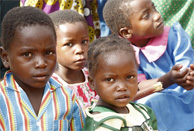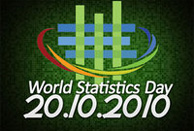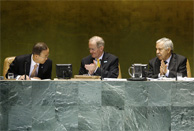DESA News
Volume 14, No.10 - October 2010
Feature articles

More than one billion people in the world live on less than one dollar a day. In total, 2.5 billion struggle to survive on less than two dollars per day. Every year, eleven million children die, most under the age of five and more than six million from completely preventable causes like malaria, diarrhea and pneumonia.
Against this scenario, the International Day for the Eradication of Poverty (17 October) will be commemorated on Monday, 18 October, with the theme “From poverty to decent work: bridging the gap”. The Day presents an opportunity to acknowledge the efforts and struggles of people living in poverty, to hear their voices and concerns and to recognize that poor people are at the forefront of the fight against poverty.
Through its resolution 47/196, of 22 December 1992, the General Assembly declared 17 October as the International Day for the Eradication of Poverty and invited all States to devote the Day to presenting and promoting, as appropriate in the national context, concrete activities with regard to the eradication of poverty and destitution. The resolution further invites intergovernmental and non-governmental organizations to assist States, at their request, in organizing national activities for the observance of the Day, and requests the Secretary-General to take, within existing resources, the measures necessary to ensure the success of the Day’s observance.
Back in time
The observance of the International Day for the Eradication of Poverty can be traced back to 17 October 1987. On that day, over a hundred thousand people gathered at the Trocadéro in Paris, where the Universal Declaration of Human Rights was signed in 1948, to honour the victims of extreme poverty, violence and hunger. The gathering proclaimed that poverty is a violation of human rights and affirmed the need to come together to ensure that these rights are respected.
These convictions are inscribed in a commemorative stone unveiled on that day. Since then, people of all backgrounds, beliefs and social origins have gathered every year on 17 October to renew their commitment to the eradication of poverty and to show their solidarity with people living in poverty. Replicas of the commemorative stone have been unveiled around the world and serve as a gathering place to celebrate the Day.
During the implementation of the first Decade for the Eradication of Poverty (1997-2006), several United Nations summits and conferences resulted in negotiated outcomes focused on national, regional and international efforts for poverty eradication. These include the UN Millennium Declaration, the Monterrey Consensus of the International Conference on Financing for Development and the 2005 World Summit Outcome.
Despite these commitments to poverty eradication, the progress made in reducing poverty world-wide has been uneven. Secretary-General Ban Ki-moon has emphasized that “With the right investments and concrete action, we can build upon the gains, fulfil our commitments, and ensure that every man, woman and child has the opportunity to make the most of their potential.”
Expanding decent work opportunities
In December 2007, the General Assembly proclaimed the Second UN Decade for the Eradication of Poverty (2008-2017) with the theme of “Full employment and decent work for all”, reiterating that eradicating poverty is the greatest global challenge facing the world and a core requirement for sustainable development, especially for developing countries. The proclamation recalls the outcomes of the World Summit for Social Development and the twenty-fourth special session of the General Assembly.
The Second Decade aims at supporting, in an efficient and coordinated manner, the internationally agreed development goals related to poverty eradication, including the Millennium Development Goals (MDGs). It stresses the importance of reinforcing the positive trends in poverty reduction in some countries and extending such trends to benefit people worldwide. It further highlights the importance of achieving inclusive growth, including full and productive employment and decent work for all.
According to the International Labour Organization (ILO), the number of workers in vulnerable employment worldwide is estimated to be more than 1.5 billion, equivalent to over half (50.6%) of the world’s working population.
The ILO estimates that the global unemployment rate reached 6.6% in 2009, up 0.9% from 2007. Youth have been disproportionately affected by the global economic and financial crisis and the global youth unemployment rate rose from 11.8% in 2007 to 13.4% in 2009.
The observance this year will share ways in which to promote decent work, taking into account the existing efforts and experiences of people living in poverty, as well as youth, their families and those working in the informal sector.
During the recent MDG Summit, Member States committed themselves to accelerate action against poverty. The Secretary-General reminded the international community that “there is more to do for the mother who watches her children go to bed hungry” and that it must stay true to its “commitment to end the dehumanizing conditions of extreme poverty.”
For more information: http://www.un.org/esa/socdev/social/intldays/IntlDay/2010.html

“Let us make this historic World Statistics Day a success by acknowledging and celebrating the role of statistics in the social and economic development of our societies and by dedicating further efforts and resources to strengthening national statistical capacity,” said Secretary-General Ban Ki-moon in a letter to World Leaders in July 2010.
For the first time this 20 October, the observance of World Statistics Day (WSD) will bring the world’s attention to the importance of statistics in decision-making. The United Nations General Assembly designated this day to acknowledge the crucial role of statistics in policy-making, transparency and accountability.
The WSD was established by a resolution of the General Assembly in June this year under the theme “Celebrating the many achievements of official statistics,” acknowledging their importance for national socio-economic development and as a basic pillar of democracy.
The date 20 October 2010 was chosen as the year rounding in ‘0’ has always been an important year in official statistics. In many countries, this is the year when the population and housing census is conducted. It is also the base year for the trend analysis in economic statistics or in compilation of national accounts or input-output tables. In 2010, some 3 billion people will be counted in some 60 countries. The date, 20-10-2010 brings into focus the importance of this year.
The United Nations resolution asserts that it is essential for countries to count with national statistics capabilities in order to produce reliable and timely statistics and indicators that may serve as the basis for informed decisions based on the core values of service, integrity and professionalism. The document recognizes the long history of official statistics and the facilitating role played by the United Nations since the creation in 1947 of the Statistical Commission, which was tasked with promoting the development of national statistics and improving their comparability, coordinating the statistical work of specialized agencies, developing central statistical services of the Secretariat, advising the organs of the United Nations on general questions relating to the collection, analysis and dissemination of statistical information and promoting the improvement of statistics and statistical methods generally.
The resolution also highlights the fundamental importance of sustainable national statistical capacity to produce reliable and timely statistics and indicators measuring a country’s progress, which are an indispensable basis for informed policy decision making and for monitoring the Millennium Development Goals. The celebration of the World Statistics Day (WSD) will acknowledge the service provided by the global statistical system at national and international level, and hope to help strengthen the awareness and trust of the public in official statistics. It serves as an advocacy tool to further support the work of statisticians across different settings, cultures, and domains.
A Worldwide Celebration
The first ever World Statistics Day on 20 October 2010 is expected to be celebrated in nearly 100 countries and by 40 international organizations. Special events to mark the Day often include conferences, symposia, round-tables, press conferences and exhibits
Activities at national level will highlight the role of official statistics and the many achievements of the national statistical system. International, regional and subregional organizations will complement national activities with additional events.
The President of Peru, Alan Garcia Pérez, will host a conference to celebrate World Statistics Day in the President’s residence Palacio de Gobierno. In Italy, a message from the President of the Republic, Giorgio Napolitano, will be issued to mark the Day.
In Morocco, the King will participate in the observance of the event. Commemorative WSD stamps will be issued in China and Mauritius.
The UK’s Royal Statistical Society will launch on 20 October a major statistical literacy campaign to sensitize the public on the benefits of statistics.The International Association for Official Statistics (IAOS) is organizing a special conference in Santiago, Chile to commemorate the WSD.
At the same time, many countries will use WSD to raise public awareness about their censuses, through press events or promotional materials in schools.
The National Bureau of Statistics (NBS) of China and the United Nations will organize at the United Nations Pavilion of the World EXPO Shanghai 2010 a ceremony featuring high-level officials of China.
The United Nations will hold a press launch of major statistical reports. One report will be on the current situation of women worldwide, 15 years after Beijing’s World Conference on Women called “World’s Women 2010”. This publication was released by DESA’s Statistical Division and will be launched in New York and Shanghai.
United Nations bodies will organize joint conferences, meetings or receptions to mark World Statistics Day in Geneva, Vienna, Santiago, Washington and Montreal.
For more information: http://unstats.un.org/unsd/wsd/Default.aspx

While expressing deep concern that progress has fallen far short of what is needed, the United Nations Summit on the Millennium Development Goals (MDGs) held in New York from 20-22 September ended with confidence that with renewed global commitment the targets to slash hunger, poverty, disease and a host of other social ills can still be achieved by 2015.
“This Summit has laid a solid foundation for the progress we need in our quest to achieve the Millennium Development Goals (MDGs) by the internationally agreed deadline of 2015,” said Secretary-General Ban Ki-moon during the closing session of the MDG Summit. “The Summit outcome document sends a clear sign that you remain committed to the goals even in a difficult international environment,” he added.
Video:
http://www.unmultimedia.org/tv/webcast/2010/09/secretary-general-ban-ki-moon-closing-statement-mdg-debate.html (5:48 minutes)
Statement: http://www.un.org/apps/sg/sgstats.asp?nid=4798
Website: http://www.un.org/en/mdg/summit2010/index.shtml
Outcome document: http://www.un.org/en/mdg/summit2010/pdf/mdg%20outcome%20document.pdf



